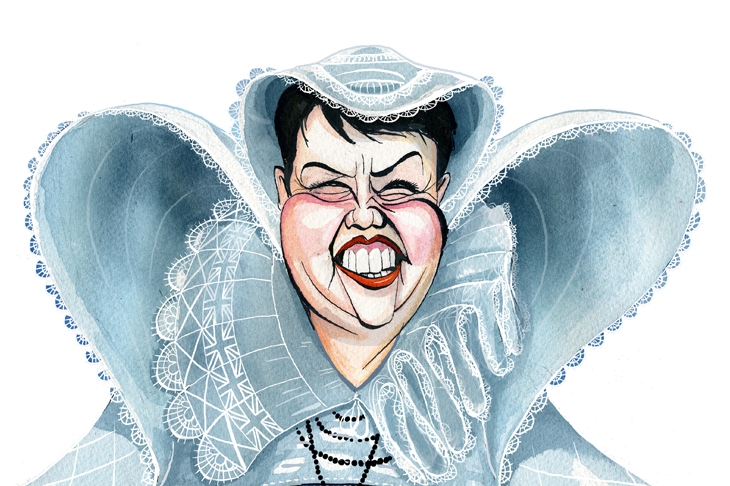On this week’s episode, we look at the rebirth of the Scottish Conservatives, ask whether it’s helpful to call Marine Le Pen a fascist, and consider what the future holds for Britain’s opposition parties.
First, in this week’s magazine, Alex Massie profiles Ruth Davidson, the leader of the Scottish Conservatives, who has overseen an extraordinary regeneration for her party in the last two years. Are the Tories the Unionist force du jour in Scotland? And can they make significant gains off the SNP, in a country that has had a frosty relationship with their English siblings? Ruth joins the podcast to discuss their campaign, along with Fraser Nelson.
As Alex Massie writes in his cover piece:
“…the last time the [Conservatives] won more than a quarter of the Scottish vote, in 1983, its current leader, Ruth Davidson, was four years old. Two years ago, the Tories won just 14 per cent of the vote, an even worse result than 1997… How different it all looks now. The most recent opinion polls in Scotland suggest the Tories could win as many as one in three ballots cast on 8 June. One opinion poll even suggested that, albeit on a uniform swing, the party could win as many as a dozen Scottish seats — including Moray, seat of the SNP’s Westminster leader Angus Robertson. In an era where elections are delivering extra-ordinary results, one might just be a stronger union and a strange rebirth of Scottish Conservatism.”
And Ruth tells the podcast that the party has significant ambitions in Scotland:
“These are some great polls that we’ve had in, but polls aren’t votes. We’re going to work really, really hard until the general election to make sure that we make good on our promise. But I think we have got some very strong indicators, for example in the Scottish elections last year to the Holyrood parliament, we more than doubled our share of the vote. We doubled our number of seats from 15 to 31. We leapfrogged Labour, put them in third place for the first time in 60-some years, and became the official opposition in Scotland. Now I’m pretty ambitious for the party, so that’s not really good enough for me. I’ve got to now turn us into a government in waiting, but it does show that there is a genuine and sustained recovery.”
Next, we look at the ‘far right’ and in what form such a thing still exists. In this week’s magazine, Douglas Murray rails against the cheap association of Marine Le Pen and the Front National with historic fascist movements, and he joins the podcast along with David Goodhart, author of The Road to Somewhere: The Populist Revolt and the Future of Politics, to discuss whether it is dangerous to apply these tags too liberally.
As Douglas writes:
“Today there are groups that campaign against Ukip as ‘far-right’, leading one to wonder what political language they would use if the jackboots came, all their imprecations having been expended on corduroyed ’Kippers? Such overuse of the term has eroded the boundaries it created, making many people suspicious of all such designations. Many people — especially young people — are less suspicious of the National Front than they perhaps ought to be because they have seen people who do not deserve the label ‘far-right’ being branded in precisely such a way.”
And David agrees, saying that:
“The Conservative party is anti-mass immigration. It’s a perfectly legitimate position to hold and, of course, this is part of the problem. The word ‘populism’, for all of its looseness and slackness, is, in some ways, a more useful one here. There are ‘populist’ parties and there are ‘far right’ parties. I think the Front National, Ukip and so on should be described as populist parties. And the thing about populism, as many people who study it point out, is that it’s utterly mainstream in our political culture. Wariness towards elites, it’s built into the US constitution, you know. Why do we have the separation of powers? Because we’re suspicious of people accumulating too much power.”
Finally, we return to home turf and the budding general election campaign. In his column this week, James Forsyth considers what shape the opposition parties will be in, should the polls hold out and the Tories romp to victory. He joins the podcast to discuss this, along with Isabel Hardman. As James writes in his piece:
“What passes for optimism in moderate Labour circles these days is the belief that a shellacking in this election will lead to Jeremy Corbyn’s departure, as the party’s membership sobers up and elects a new and sensible leader. But it is far from certain that this will happen. The eagerness of the Corbynites to get their people parachuted into safe seats suggests that they are still more interested in capturing the Labour Party than winning power. They aren’t planning on going away anytime soon.”
And the Lib Dems don’t appear to be in good shape either, with Isabel observing:
“Things did not go well for them in 2015. They do have a completely different pitch now, but there are people who were associated with the coalition who are standing again in certain seats, like Jo Swinson. They’ve had a few boosts, such as Rachel Johnson joining them, and I suppose that sort of appeals quite well to the audience they’re trying to pitch. But what doesn’t appeal… is their leader having to go on and on and on about whether or not he thinks gay sex is a sin, and then a row about anti-semitism. I think those are two things the sort of pro-Remain, young, potentially quite – I don’t want to say ‘metropolitan’ – but quite liberal audience that they’re trying to win back, is going to be really put off by.”
The Spectator Podcast will be appearing in its regular Thursday slot throughout the election campaign, but we’ll also be providing you with daily editions of Coffee House Shots, our political podcast, so do subscribe on iTunes to get our take on the latest twists and turns as soon as they happen.
This podcast is sponsored by Berry Bros. & Rudd, who have long supplied wine for The Spectator. If you’ve always wanted to start a wine cellar, 2017 could be the perfect time. Whether you are looking to buy for future drinking, for investment or a little of both, Berry Bros. & Rudd’s Cellar Plan is designed to suit all tastes and budgets. A personal Account Manager will be on hand to offer advice and assistance, and enable you to benefit from three centuries’ worth of relationships with the leading wine growers. To find out more about starting a wine cellar with Berry Bros. & Rudd, visit bbr.com/cellarplan










Comments